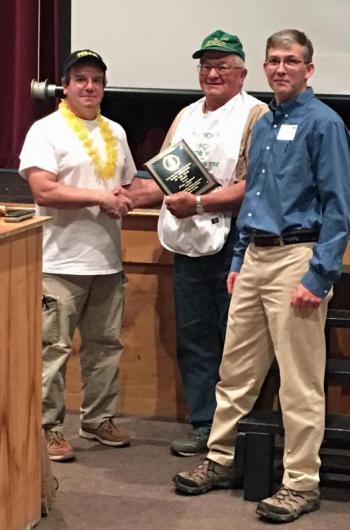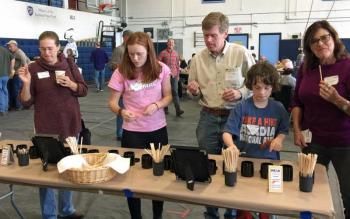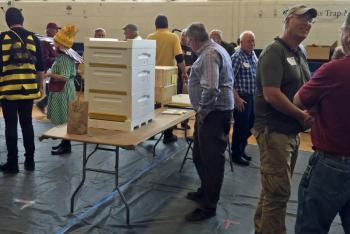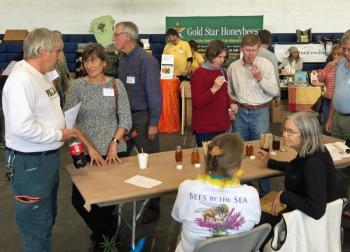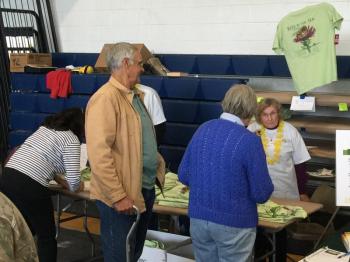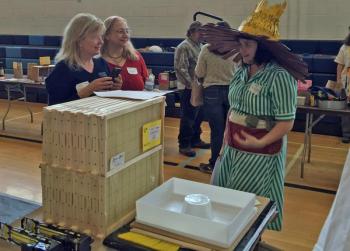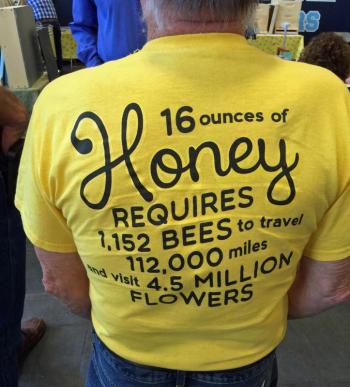Thomaston’s Peter Lammert named state Beekeeper of the Year
ROCKLAND — The Maine State Beekeepers Association Annual Meeting and Conference was held Oct. 15 in Rockland, and during the business portion of the event, Peter Lammert, of Thomaston, was named State Beekeeper of the Year. The Meeting was hosted by Knox-Lincoln County Beekeepers club, whose president is David Spicer.
Also at the meeting, MSBA President Richard McLaughlin recognized Rick Cooper, Maine's first Eastern Apicultural Society Master Beekeeper, with a Lifetime Achievement Award.
In the nomination he submitted for Cooper for the Lifetime Achievement Award, Spicer wrote: “Rick has been keeping bees for almost 40 years and has been teaching people about them for 30 years. He is Maine's first EAS Master Beekeeper and has been recognized by the MSBA as Beekeeper of the Year. He has held the office of president in both the MSBA and EAS. He is credited by Jean Vose as having helped establish the KLCB some 15 years ago and is still involved with us today. He leads open hive sessions and assists with teaching various bee schools around the state. Concerning outreach education to beekeepers and the public at-large, Rick has probably done it. He is willing to write articles, make presentations to various groups, assist with bee schools, take interviews, and promote sound beekeeping practices to all. I have heard him say a few years back that he has personally trained over 500 beekeepers in Maine. Most all of us know him, what he stands for, the person he is, and what he has done for beekeeping across the State of Maine.”
The MSBA Beekeeper of the Year Award is given annually to a beekeeper, “who has, over a period of years, demonstrated and promoted good beekeeping, improved the public image of the industry and served the industry as a volunteer.”
Lammert is a member of the Knox-Lincoln County Beekeepers, recognized as one of the state's more robust and active beekeeping clubs, which provides an active mentoring program and comprehensive bee school that often fills to capacity.
In his nomination of Lammert for Beekeeper of the Year, Spicer wrote: "Peter keeps bees at his home in Thomaston and is a valued speaker on such topics as the delicate balance in our ecosystem between bees and woodlands. He is innovative and always thinking about better and more interesting ways to keep and help bees."
Lammert began keeping bees in 2004, when he was introduced to the hobby through the Knox-Lincoln County Beekeepers Bee School. Since then, he has served as a KLCB Board Member, Bee School instructor (2006-present), MSBA Delegate (2006-2007) and longstanding member of the KLCB Swarm Catchers Program (2006-present).
An advocate of sharing his knowledge and experience, Lammert has also volunteered his time with the KLCB Mentors Program since 2006 and since 20012, has served as the KLCB Outreach Coordinator, organizing the club's presence and participating in fairs, school talks, adult talks and more.
In July 2016, Lammert spoke to the George's River Land Trust as part of the their walk on Appleton Ridge to explore the link between pollinators and Maine bluberry production, and demonstrated how a hive works, along with offering samples of honey.
Lammert is also a regular participant representing KLCB at Union Fair, Open Farm Day at Brae Maple Farm in Union and at the Knox-Lincoln Soil & Water Conservation Fair held annually at Union Fairgrounds.
Lammert has also served, and in some capacities still serves the town of Thomaston as a selectman, tree warden, sexton, and member of the fire and ambulance departments. He retired in 2011, after 35 years, as the Maine Forest Service Utilization and Marketing Forester, and has written related articles for the Maine Small Woodland Owners Association of Maine's monthly newsletter, Woodlands.
The President's Award went to Matt Scott of Belgrade, for his many years of service and dedication to the beekeepers of Maine and the MSBA. Scott was one of the founding members of the MSBA.
More than 300 people attended the MSBA state meeting and workshop at Oceanside High School in Rockland, which was hosted by and put on by members of KLCB.
Attendees, all members of MSBA as well as many affiliated with beekeeping clubs around the state, had the opportunity to participate in a honey tasting contest, were treated to a full lunch put on by school staff, and there was a raffle for dozens of donated items. The largest and most valuable raffle items included full hive set-ups, either traditional wood or in one case, a Styrofoam hive, and a honey extractor.
As for the honey tasting contest, everyone was invited to compete, with all entries being placed in unmarked black jars to maintain anonymity, as well as to keep tasters from making early judgments based on honey color.
In total, there were 27 entries in the 2017 Black Jar Honey Tasting Contest, and the honey with the most votes garnered 11, followed by 8 votes and 6 votes.
When the final voting was tabulated, 1st place went to Dan Kary of Green (Androscoggin County), 2nd place went to Nancy Douglas of Round Pond (Lincoln County), and in 3rd place was Tim Forrester of Woolwich (Sagadahoc County.)
Ribbons and prizes were awarded to the winners.
During the Saturday event, attendees heard from three distinguished speakers, including Dr. Tom Seeley (author of Honeybee Democracy); Lincoln Sennett of Swan's Honey; and Dr. Carla Essenberg.
Seeley talked about "bee hunting" and how to set up boxes to act as traps to lure in swarms looking for a new home. He also talked about considering a bee colony as a "honey factory."
Sennett offered information he has gleaned trying to manage every beekeepers' greatest concern: varroa mites. He discussed his work and experimentation with an integrated method of controlling and lowering mite populations by both interrupting their life cycle and killing them before they can live long enough to reproduce.
Essenberg is a researcher, exploring ways plants and pollinators interact, specifically bumblebees and flowers. She and her students have spent time in the lab "teaching" bumblebees to recognize different size plants and different colors too, and how rewards, in the form of nectar (the reward), assists or hinders decision-making. Essenberg said that much of their work continues, with more work needed to make definitive conclusions about who is influencing whom when it comes to plants and pollinators.
For more information, or to become a member of MSBA, visit mainebeekeepers.org. For more information about KLCB, to join or learn about the upcoming 2017 Bee School, visit klcbee.com.
Reach Editorial Director Holly S. Edwards at hollyedwards@penbaypilot.com and 207-706-6655.


3476_SpicerLammertMcLaug.jpg)
